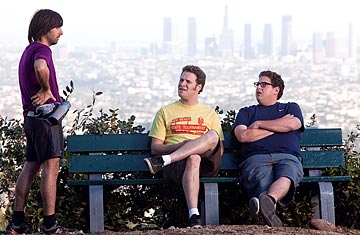
From left: Jason Schwartzman, Seth Rogen and Jonah Hill in Funny People
A 40-year-old needs to retire his record as America's oldest male virgin. A schlub gets drunk and impregnates a woman he just met. The two films that Judd Apatow has written and directed, not including the 493 (actually, seven) other comedies he has produced in the past two years, are relationship pictures. The dialogue may be raunchy, the subsidiary characters beyond rude, but at the movies' core, Apatow wants you to know, there's a real, beating, borderline-mushy heart.
That heart comes bursting out of Funny People, Apatow's intermittently engaging, 2 hr. 26 min. essay in schizo-cinemaphrenia. A transparent attempt to make a grown-up film, it's got two worldviews — one comically misanthropic, the other sloppily sentimental — that have little in common with each other. It's as if, halfway through, you went out for popcorn and mistakenly returned to an auditorium showing a different picture. And that second movie ends immolating itself.
Apatow casts his long-ago roommate Adam Sandler as George Simmons, a star of movie comedies who has been diagnosed with a terminal disease, and who hires Ira Wright (Seth Rogen), a struggling young comedian, as his assistant. In what he presumes to be his last days, George realizes he's essentially friendless and loveless, and tries to rekindle the old affair with Laura (Leslie Mann), then a young actress, now a wife and mother.
On its surface, Funny People is about stand-up comedians who have a love-hate obsession with their penises. In the movie's many stand-up routines, Apatow surely breaks the feature-film record for dick jokes, including one told by Andy Dick. It ought to be called Funny Penises. Yet Apatow is much less interested in showing sex than in having people talk about it. George has plenty of one-night stands, but mainly as an exercise of his star power. For all the girls he takes home and beds, he's essentially alone — the proverbial celebrity who finds it lonely at the top, and who is wary of any new person who wants in, including Ira (whom Rogen invests with a cuddly-toy irresistibility). "You're not my friend," he tells Ira. "You work for me." George wants a last chance at human connection, in the person of Laura. And that's where Funny People spins off the rails.
It's said that inside every comedian is the urge to play Hamlet. (Hey, Mel Gibson did it.) Well, inside Judd Apatow, he wishes, is a secret Jim Brooks. James L. Brooks is the sitcom titan (Mary Tyler Moore, Taxi, The Simpsons) who forged an Oscar-winning film career as the writer-director of comedy-dramas about attractive neurotics. The needy souls from Terms of Endearment, Broadcast News, I'll Do Anything and As Good As It Gets were all variously self-aware and self-absorbed, and they struck viewers not as comic constructs but as real, flawed people — who, on the side, were funny.
Brooks is the secret touchstone of Funny People; indeed, its two-part structure is Terms of Endearment in reverse, with the deadly disease coming before the lovey stuff. (Sandler even did a Jim Brooks film; unfortunately, it was that rare Brooks misfire, Spanglish.) And where Brooks' stories are usually about the fine line of ethics in human relationships — does a newsman fake a tear in an interview? Does a production assistant lie about her boyfriend to her producer? — this one is about whether a man who says he needs love really deserves it. And (POSSIBLE SPOILER ALERT) the big ethical question is whether a hardened comedian will get all teary when he sees a 10-year-old dressed as Grizabella and singing "Memory" from Cats.
It's a heavy dollop of sentiment that will baffle both Apatow's fan base and those who watched the first half of the movie. Isn't this picture about whether George and Ira will become friends? Isn't there a guy-comedy rule that there's no crying in bromances? And isn't Cats the most derided popular musical in Broadway history? You may recall that, on David Letterman's first CBS show in his new Broadway theater, Paul Newman stood up in the audience and shouted, "Where the hell are the singing cats?" Well, here is a singing cat, and for a comedian not to get moist and misty over it simply means he's being true to his own iconoclastic muse.
Apatow has mixed humor and heart before, but never humor so raw or heart so bleeding. He sets up his audience to go for the gross, then tell them to feel deeply for the folks he's been making fun of. He wants it both ways, and gets neither. Many of his fans, without begrudging his stab at working outside his comfort zone, will beg him to please, please, go back and make Judd Apatow movies.
